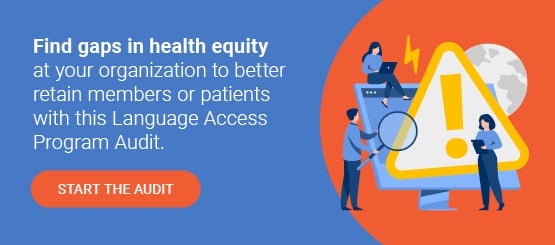The National Committee for Quality Assurance (NCQA) is dedicated to improving the quality of healthcare in the United States. But studies show that the caliber of healthcare individuals receive varies significantly based on their cultural and linguistic backgrounds, as do the associated outcomes. Not only does this negatively impact the health of the individual, but it also hurts the bottom line of healthcare organizations. For example, according to NCQA, "Racial disparities cost the U.S. an estimated $93B in excess medical costs and $42B in lost productivity per year.”
In order to improve healthcare access and outcomes, as well as reduce costs, we need to address these inequalities. To this end, NCQA recently discontinued its Multicultural Healthcare Distinction program in favor of a new and more comprehensive Health Equity Accreditation. Here, we examine some of the key differences between the old program and the new, and what it all means for your organization.
Health Equity Accreditation and Multicultural Healthcare Distinction Compared
The Multicultural Health Care Distinction was based on the Office of Minority Health’s Culturally and Linguistically Appropriate Services (CLAS) Standards and focused on race, ethnicity, and language as the key barriers to care.
The Health Equity Accreditation goes one step further: it requires organizations to develop standardized structures, processes, and goals that address inequities and improve care. This means taking a more holistic approach to understanding barriers to care and helping members overcome them.
- The new accreditation addresses the following areas:
- Organizational readiness
- Collection of race/ethnicity, language, gender identity, and sexual orientation data
- Access and availability of language services
- Practitioner network cultural responsiveness
- Culturally and linguistically appropriate services programs
- Reduction in health care disparities
To get and maintain accreditation your organization must demonstrate that your programs are having a measurable impact and that you have processes and systems in place to sustain further improvement in health equity.
In addition, an increasing number of state agencies now require the Health Equity Accreditation. Even where it’s not required, it demonstrates your organization’s commitment to ensuring all members have access to quality care, and it improves your appeal when competing for contracts.
Health Equity Plus: A New Way To Differentiate Your Organization
In 2021, NCQA also introduced a new level of accreditation: Health Equity Plus.
To earn the Health Equity Plus certification, your organization must meet all of the Health Equity standards as a starting point. Beyond that, you must also incorporate activities to identify subpopulations that share intersectional characteristics, identities, social risk factors, and needs. Then, you’ll need to make adjustments to serve them better.
In short, your organization will need to gather data to see what drives the health outcomes affecting the different segments of your membership and come up with impactful ways to address these underlying factors.
Health equity is a community-wide issue with deep structural roots. It’s not just about what happens when members are enrolling in a health plan. As a result, there’s only so much that any healthcare organization can do on its own to address these disparities.
Recognizing this, the standards for Health Equity Plus Accreditation inspire healthcare organizations to engage with partners to expand the impacts of these initiatives by requiring organizations to:
- Develop cross-sector partnerships to assist targeted populations
- Share data with cross-sector partners to support interoperability while maintaining member privacy.
- Refer members to cross-sector partners when appropriate and track outcomes.
What ULG Recommends
As of April 2022, Health Equity Accreditation is now a requirement for contracts in six states, and that number is growing. Meanwhile, approximately 176 million Americans are enrolled in a health plan with this accreditation. These facts, combined with increasing social pressure for organizations to address long-standing inequities, indicate that the Health Equity Accreditation could become a baseline standard for good business practices moving forward.
Organizations that wish to differentiate themselves by doing more than the minimum should consider whether the Health Equity Plus Accreditation makes sense for their business, either now or as a goal to work toward in the future. Accessing the standards and guidelines for the Health Equity and Health Equity Plus Accreditation can help you determine what makes the most sense. These guidelines, including surveys to gauge your organization’s readiness, can be found here, in NCQA’s online store.
The bottom line is simple: The general public and state agencies alike are more focused on equity in healthcare than ever before. If your organization already has Health Equity Accreditation, that’s wonderful! Now is an excellent time to look toward the future and stay ahead of the curve. And if you aren’t accredited yet, now is the perfect time to bring your practices in line with these standards.
Offering easy and timely access to culturally adapted communication, including language services for at-risk members, is a vital part of this process. That’s where we come in.
How ULG Can Help
Not sure which accreditation is right for you, or how to get started? At ULG, we have more than 35 years of experience in the healthcare industry with a special focus on health equity. Effective communication is key to improving health equity and outcomes, and we excel in innovative healthcare engagement solutions tailored to the needs of your diverse membership.
Our expert consultants are ready and waiting to guide you through the accreditation process. Contact us for a consultation today!
.png)


